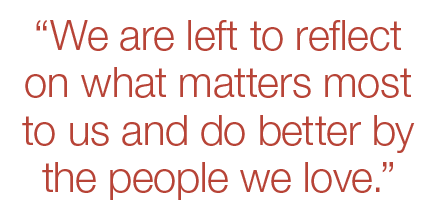
Family Matters: Disconnecting for Self-Protection
Shavonda Bean
Many of us were raised with the understanding that family comes first. You honor and respect your parents because they are your parents and elders are held in high regard. We protected the family at all costs and blood was always thicker than water! Many were raised to be quiet about abuse, discrimination and wrongdoing to protect the reputation of the family and to remain cohesive. However, in this environment, dysfunction can persist and become normalized, and abuse and hurt can continue. This façade leaves many silently in pain, anxious and resentful.
As the Black culture becomes increasingly open to therapy, the experience has been life changing. Therapy provides a space to process grief, come to terms with the past and regain self-love and healing. During the process of healing and self-preservation, many people eventually distance themselves or become completely estranged from their families. Research by Karl Pillemar in 2020 showed that 1 in 4 Americans are estranged from their families.
The idea of honoring parents and remaining connected to the family unit has seen a shift. More individuals are choosing to protect their mental health and decide which relationships are worth maintaining and will create space between themselves and those family members whose behaviors or ideals don’t align with what is considered healthy for them. More young adults are free to think independently and will move away from any relationship they consider unsupportive or toxic. More people, especially younger generations, are empowered to use their voices to speak up for what they believe is right. This liberation allows individuals to choose themselves and their own needs over those that might have been considered best for the family unit in the past.
Distance and estrangement from unhealthy relationships can improve mental health and well-being. In many cases it is necessary. However, it is often difficult for all involved. The Parent-Child estrangement is one of the most difficult. Parents make tremendous sacrifices and efforts to care for their children and provide the best they can and still can find themselves cut off by their children as they transition into adulthood. Parents and children often have different understandings about why the estrangement even occurred, making resolution more complicated. Severing the generational bonds between parents, children and grandchildren, aunts, uncles, and nieces and nephews, the special connections between cousins and siblings is not without cost. The emotional toll of estrangement can increase risk for depression, isolation, grief, lack of trust, decreased loyalty, chronic stress and limits access to needed supports and protection.
Where do we go from here? The alternative forces us to be mindful of how we treat others, to respect values and beliefs, to acknowledge our wrongs, make necessary changes and grow. We are left to reflect on what matters most to us and do better by the people we love. Family on its own is simply a genetic relation, but the family bond is much more. The bond offers reprieve under stress, boosted self-esteem, reduced anxiety, a sense of belonging and protection, improved academic and behavioral functioning and resilience. When these relationships are healthy, they are invaluable, and life is richer. Therapy can help in the process of reunification by guiding relationships towards healthy communication, reduced defensiveness, honesty, empathy, releasing control and rebuilding. When reconciliation is safe, healthy and possible, it might not be easy, but it is a journey worth taking.

